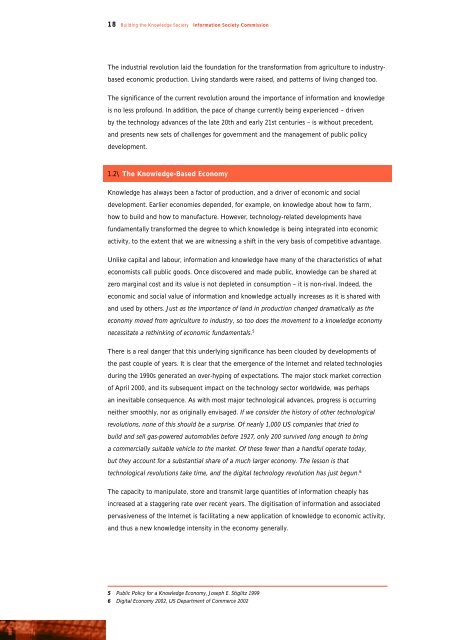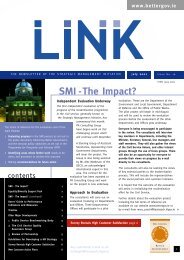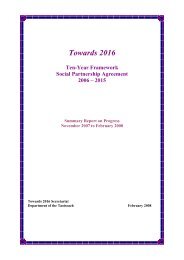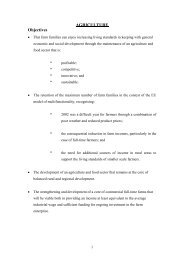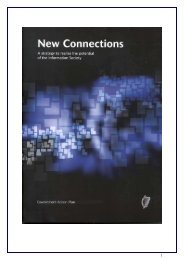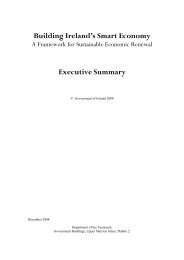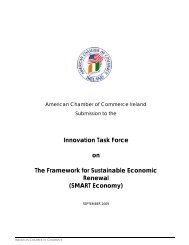Building the Knowledge Society - Department of Communications ...
Building the Knowledge Society - Department of Communications ...
Building the Knowledge Society - Department of Communications ...
Create successful ePaper yourself
Turn your PDF publications into a flip-book with our unique Google optimized e-Paper software.
18 <strong>Building</strong> <strong>the</strong> <strong>Knowledge</strong> <strong>Society</strong> Information <strong>Society</strong> CommissionThe industrial revolution laid <strong>the</strong> foundation for <strong>the</strong> transformation from agriculture to industrybasedeconomic production. Living standards were raised, and patterns <strong>of</strong> living changed too.The significance <strong>of</strong> <strong>the</strong> current revolution around <strong>the</strong> importance <strong>of</strong> information and knowledgeis no less pr<strong>of</strong>ound. In addition, <strong>the</strong> pace <strong>of</strong> change currently being experienced – drivenby <strong>the</strong> technology advances <strong>of</strong> <strong>the</strong> late 20th and early 21st centuries – is without precedent,and presents new sets <strong>of</strong> challenges for government and <strong>the</strong> management <strong>of</strong> public policydevelopment.1.2\ The <strong>Knowledge</strong>-Based Economy<strong>Knowledge</strong> has always been a factor <strong>of</strong> production, and a driver <strong>of</strong> economic and socialdevelopment. Earlier economies depended, for example, on knowledge about how to farm,how to build and how to manufacture. However, technology-related developments havefundamentally transformed <strong>the</strong> degree to which knowledge is being integrated into economicactivity, to <strong>the</strong> extent that we are witnessing a shift in <strong>the</strong> very basis <strong>of</strong> competitive advantage.Unlike capital and labour, information and knowledge have many <strong>of</strong> <strong>the</strong> characteristics <strong>of</strong> whateconomists call public goods. Once discovered and made public, knowledge can be shared atzero marginal cost and its value is not depleted in consumption – it is non-rival. Indeed, <strong>the</strong>economic and social value <strong>of</strong> information and knowledge actually increases as it is shared withand used by o<strong>the</strong>rs. Just as <strong>the</strong> importance <strong>of</strong> land in production changed dramatically as <strong>the</strong>economy moved from agriculture to industry, so too does <strong>the</strong> movement to a knowledge economynecessitate a rethinking <strong>of</strong> economic fundamentals. 5There is a real danger that this underlying significance has been clouded by developments <strong>of</strong><strong>the</strong> past couple <strong>of</strong> years. It is clear that <strong>the</strong> emergence <strong>of</strong> <strong>the</strong> Internet and related technologiesduring <strong>the</strong> 1990s generated an over-hyping <strong>of</strong> expectations. The major stock market correction<strong>of</strong> April 2000, and its subsequent impact on <strong>the</strong> technology sector worldwide, was perhapsan inevitable consequence. As with most major technological advances, progress is occurringnei<strong>the</strong>r smoothly, nor as originally envisaged. If we consider <strong>the</strong> history <strong>of</strong> o<strong>the</strong>r technologicalrevolutions, none <strong>of</strong> this should be a surprise. Of nearly 1,000 US companies that tried tobuild and sell gas-powered automobiles before 1927, only 200 survived long enough to bringa commercially suitable vehicle to <strong>the</strong> market. Of <strong>the</strong>se fewer than a handful operate today,but <strong>the</strong>y account for a substantial share <strong>of</strong> a much larger economy. The lesson is thattechnological revolutions take time, and <strong>the</strong> digital technology revolution has just begun. 6The capacity to manipulate, store and transmit large quantities <strong>of</strong> information cheaply hasincreased at a staggering rate over recent years. The digitisation <strong>of</strong> information and associatedpervasiveness <strong>of</strong> <strong>the</strong> Internet is facilitating a new application <strong>of</strong> knowledge to economic activity,and thus a new knowledge intensity in <strong>the</strong> economy generally.5 Public Policy for a <strong>Knowledge</strong> Economy, Joseph E. Stiglitz 19996 Digital Economy 2002, US <strong>Department</strong> <strong>of</strong> Commerce 2002


